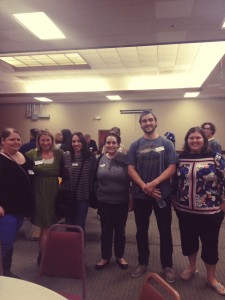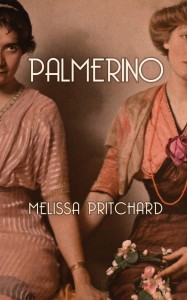 This semester, a handful of the Superstition Review interns attended one of UMOM’s weekly Read-To-Me nights, and I was lucky enough to be there.
This semester, a handful of the Superstition Review interns attended one of UMOM’s weekly Read-To-Me nights, and I was lucky enough to be there.
UMOM is the largest homeless shelter in Arizona, located in our very own downtown Phoenix. Their mission is to provide homeless families and individuals with safe shelter and supportive services including classes and daycare in an effort to assist the residents in reaching their greatest potential. UMOM aims to break the cycle of homelessness by teaching their residents how to grow as members of society. The Read-To-Me night that we attended is a program that they’ve designed to break the cycle of illiteracy among the children of these families.
We walked in not knowing what to expect. A then vacant room would soon be filled with tables of books for volunteers to read to the children living at the UMOM center, an old hotel in Phoenix that has been reverted into housing for families in need of assistance and guidance. Every Tuesday night the recreation room at UMOM is converted into a makeshift library where children can come pick out books for volunteers to read to them. There are picture books and storybooks for the beginning reader to about the middle school aged reading level. At the end of the night the children are allowed to take three books with them to help build their own personal libraries and reading habits.
Before the children came, the program director went over a few helpful tips for the night. “Don’t be let down if you get dumped,” she said, “It’s nothing personal.” We all laughed and before we knew it there were children everywhere picking up books and partnering with readers. Some wanted to read, and others wanted to be read to; other children simply went around collecting books from different series for their collections of Goosebumps or The Magic Tree House.
I tried more than a few times to sit one of the children down to be read to, but it seemed like most of them had other plans. As I waited for a child to ask me to read to him, I marveled over the spectacle in front of me. The room that had once been empty and silent was now alive with people picking through books and turning through pages. Even though most of us had stock piled the books we remembered and loved from our own childhoods, the children presented us with the books that they wanted to explore. Obviously, this was not the first rodeo for many of the children. It was they who held the reins in the literary roundabout. Friends were made over books and memories, and the shared smiles on the faces of the volunteers and children alike showed the true magic that can only be found with one’s nose stuck in a book.
After about fifteen minutes of waiting, one of the directors asked if I had any experience with young children and if I would mind going into the nursery. “Sure, I guess,” I told him. No, I did not have any experience with young children, and no, I had no idea what I was doing, but I figured I would help in any way they needed. They were the experts after all.
I left the recreation room and went back to the nursery where about eight young children under the age of five sat playing with three older women. I was apprehensive at first, but as soon as I entered the tiny room a young boy greeted me with a toy fire truck ready to play. I sat on the floor and pushed the truck around with him and tried my best to keep his attention, but sure enough he soon got bored with me and another child was ready to play.
After a while I found myself at the table coloring with a young girl. She was not rowdy or unruly like the boys, but rather she was calm and sure of herself. “Why don’t you sit here,” she said patting the small chair next to her. I was sure that if I sat down I would break the chair, but I more or less crouched down steadily next to her. She was playing with an ancient toy, a blue, plastic turntable that you tape paper plates to and hold markers over as it turns. Most of the plates were what you would expect from a child aged four or younger, but this young girl kept a steady hand and drew solid circles with many different colors. To say the least, I was quite impressed. We were having a full conversation on colors that led to the ocean. She moved the turntable away and grabbed a piece of paper. “Let me show you,” she said. She proceeded to draw a seal, as she told me, and I colored in the waves above its head.
It was at that moment, thinking about how smart this girl seemed to be, that I realized how truly sorry I felt. I was born into a family that was able to send me to a private elementary school that I by no means deserved. I was told that I could be anything I wanted, and encouraged to dream. I had a backyard in a safe neighborhood that bordered the forest, and I was able to play everyday, and grow and dream. It was all I knew at her age, but here she was, this little girl, smart as could be, funny and sociable. Surely she was smarter than I was at that same age. But who was telling her to dream, and where were those dreams allowed to grow? She was four years old and growing up in a shelter, and this was not a life with which I was familiar. Here I had been given most everything in my life, and I knew that she was going to have to work much harder for it all.
When I said goodbye, I knew that it was going to be the first and last time I would ever see her, and I wished her the best. I wished that she’d find her way and someone would tell her that she was smart and could do anything she ever wanted, just like all those people that told me when I was young. And then I was happy to know that at least she was safe and had a roof over her head, and that the people of UMOM were taking steps towards the betterment of the lives of these children and their parents.
So, reader, if you ever get the chance, I highly recommend volunteering at a Read-To-Me night, and if you are not able, please visit their website to learn more ways that you can help. They are always in need of donations, and since the children are allowed to take three books home each week, UMOM is always in need of more books for the children to read.
I want to thank the people of UMOM for giving me and the other interns of Superstition Review the opportunity to volunteer with them, and I wish them a wonderful holiday season.
 We enjoyed refreshments and biscotti provided by Pritchard to help further immerse ourselves into her novel’s 19th century Italian setting. She read with power and beauty, adjusting her tone to distinguish between characters and narration. Pritchard’s writing is lyrical. Each word is carefully chosen and allows her to paint deliberate, detailed pictures in the reader’s mind. Throughout the book, tones shift as we slip back and forth through both time and voice.
We enjoyed refreshments and biscotti provided by Pritchard to help further immerse ourselves into her novel’s 19th century Italian setting. She read with power and beauty, adjusting her tone to distinguish between characters and narration. Pritchard’s writing is lyrical. Each word is carefully chosen and allows her to paint deliberate, detailed pictures in the reader’s mind. Throughout the book, tones shift as we slip back and forth through both time and voice.
